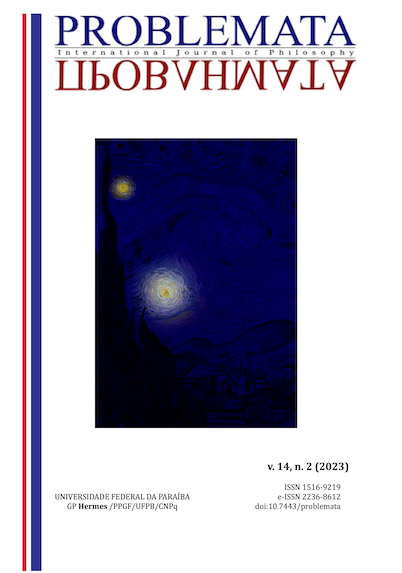SUSTAINABILITY, ALTERITY AND THE MEMORY RIGHTS
DOI:
https://doi.org/10.7443/problemata.v14i2.66080Keywords:
SUSTAINABILITY, ALTERITY, EXTERIORITY, HUMAN RIGHTSAbstract
We seek to establish in this study the necessary relationships between sustainability and alterity, with contributions to the Greater Area of Human Sciences. This article situates the discussion of human rights in the set of current socio-environmental issues. We start from the hypothesis that the return to alterity has expanded the concept of socio-environmental sustainability and the epistemic value of memory rights. The objective is to establish a critical reading of the modern commitment of the human sciences with the epistemological fracture of modernity, in search of a conception of sustainability integrated with the history of liberation of peoples. It is understood that the relations between sustainability and alterity underlie the discussion of human rights in the socio-environmental agenda of the 21st century. We carried out a philosophical briefing on the relations between sustainability and alterity in response to the ontological forms of life inherited from global capitalism. We concluded that socio-environmental confrontation requires foundations of interculturality for a new ethics of human rights.
Downloads
References
ADAMS, S. A Note on Ricœur’s Early Notion of Cultural Memory. Études Ricœuriennes/Ricœur Studies, v. 10, n. 1, p. 112-124, 2019. DOI: http://doi.org/10.5195/errs.2019.465. Acesso em: 09 mar. 2023.
ASSMANN, J.”Communicative and cultural memory”. In: ASTRID, E.; ANSGAR, N. (ed.). Cultural memory studies: an international and interdisciplinary handbook. Michigan: Walter de Gruyter, 2008.
ASSMANN, A. Espaços de recordação: formas e transformações da memória cultural. Campinas: Editora da Unicamp, 2011.
BERGSON, H. Les Deux Sources: de la morale et de la religion. RMCS, 1932. Disponível em: https://archive.org/details/in.ernet.dli.2015.324692/page/n3/mode/2up. Acesso em: 09 mar. 2023.
BOURDIEU, P. The Weight of the World Social Suffering in Contemporary Society. California: Stanford University Press, 1999.
BURKE, P. O que é história cultural. Rio de Janeiro: Jorge Zahar Editor, 2005.
BRUNELLE, D. Compte rendu de La misère du monde. Cahiers de recherche sociologique, n. 21, p. 187–190, 1993. DOI: https://doi.org/10.7202/1002229ar. Acesso em: 09 mar. 2023
DESCOLA, P. Beyond Nature and Culture. Ethnobiology Letters, v. 6, n. 1, p. 208-211, 2015. DOI: http://dx.doi.org/10.14237/ebl.6.1.2015.481 . Acesso em: 09 mar. 2023
DURKHEIM, É. As formas elementares da vida religiosa. São Paulo: Martins Fontes, 2000.
FISCINA, L. Sustentabilidade: um conceito de organização social das ordens de conservação e transformação do mundo. Psicol. USP, n. 33, p 1-9, 2022. DOI: https://doi.org/10.1590/0103-6564e200207. Acesso em: 09 mar. 2023
FOUCAULT, M. O que são as luzes: Arqueologia das ciências e história dos sistemas de pensamentos. Rio de Janeiro: Forense Editora, 2000.
GONÇALVES, J. Pierre Nora e o tempo presente: entre a memória e o patrimônio cultural. Historiæ, v. 3, n. 3, p. 27-46, 2012. Disponível em: http://repositorio.furg.br/handle/1/6852. Acesso em: 09 mar. 2023.
HARTOG, F. Régimes d’historicité: Présentisme et expériences du temps. Paris: Editions du Seuil, 2003.
HABERMAS, J. O discurso filosófico da modernidade. São Paulo: Martins Fontes, 2002.
HABERMAS, J. Direito e democracia. Rio de Janeiro: Tempo Brasileiro, 1997.
HABERMAS, J. Mudança estrutural da esfera pública. São Paulo: Unesp, 1990.
HALBWACHS, M. A memória coletiva. São Paulo: Edições Vértice, 1990.
HELLER, A. Sociología de la vida cotidiana. Barcelona: Edicions 62, 1987.
KELSEN, H.. A justiça e o direito natural. Coimbra: Livraria Almedina, 1979.
LATOUR, B. Jamais fomos modernos. Rio de Janeiro: Editora 34, 1994.
LÉVINAS, E. Totalidade e infinito. Lisboa: Edições 70, 2002.
LÉVINAS, E. Entre nous: thinking of-the-other. New York: Columbia University Press, 1998.
LÉVI-STRAUSS, C. Totemismo hoje. Rio de Janeiro: Editora Vozes, 1975.
MIGNOLO, W. Novas reflexões sobre a idéia da América Latina: a direita, a esquerda e a opção descolonial. Cad. CRH, v. 21, n. 53, p. 239-252, 2008. DOI: https://doi.org/10.1590/S0103-49792008000200004. Acesso em: 09 mar. 2023
NORA, P. Entre memória e história. A problemática dos lugares. Prog. Hist., n. 10, p. 7-28, 1993. Disponível em: https://revistas.pucsp.br/index.php/revph/article/view/12101/8763. Acesso em: 09 mar. 2023
RICOEUR. P. A memória, a história, o esquecimento. Campinas: Editora da Unicamp, 2007.
SAYAD, A. “A displaced family”. In: BOURDIEU, P. The Weight of the World Social Suffering in Contemporary Society. California: Stanford University Press, 1999.
TASSARA, E. O Pensamento contemporâneo e o enfrentamento da crise ambiental: uma análise desde a psicologia social. In: CARVALHO, I. C. de M.;
GRÜN, M.; TRAJBE, R. (org.). Pensar o ambiente: bases filosóficas para a Educação Ambiental. Brasília: MEC, 2006. Disponível em: http://portal.mec.gov.br/secad/arquivos/pdf/educacaoambiental/pensar_ambiente.pdf. Acesso em: 09 mar. 2023
VILLEY, M. A formação do pensamento jurídico moderno. São Paulo: Martins Fontes, 2009.
VILLEY, M. O direito e os direitos humanos. São Paulo: Martins Fontes, 2007.
Downloads
Published
Issue
Section
License
Copyright (c) 2023 Luciano Fiscina

This work is licensed under a Creative Commons Attribution 4.0 International License.
Authors who publish with this journal agree to the following terms:
- Authors retain copyright and grant the journal right of first publication with the work simultaneously licensed under a Creative Commons Attribution License that allows others to share the work with an acknowledgement of the work's authorship and initial publication in this journal.
- Authors are able to enter into separate, additional contractual arrangements for the non-exclusive distribution of the journal's published version of the work (e.g., post it to an institutional repository or publish it in a book), with an acknowledgement of its initial publication in this journal.
-
- Authors are permitted and encouraged to post their work online (e.g., in institutional repositories or on their website) prior to and during the submission process, as it can lead to productive exchanges, as well as earlier and greater citation of published work (See The Effect of Open Access).





